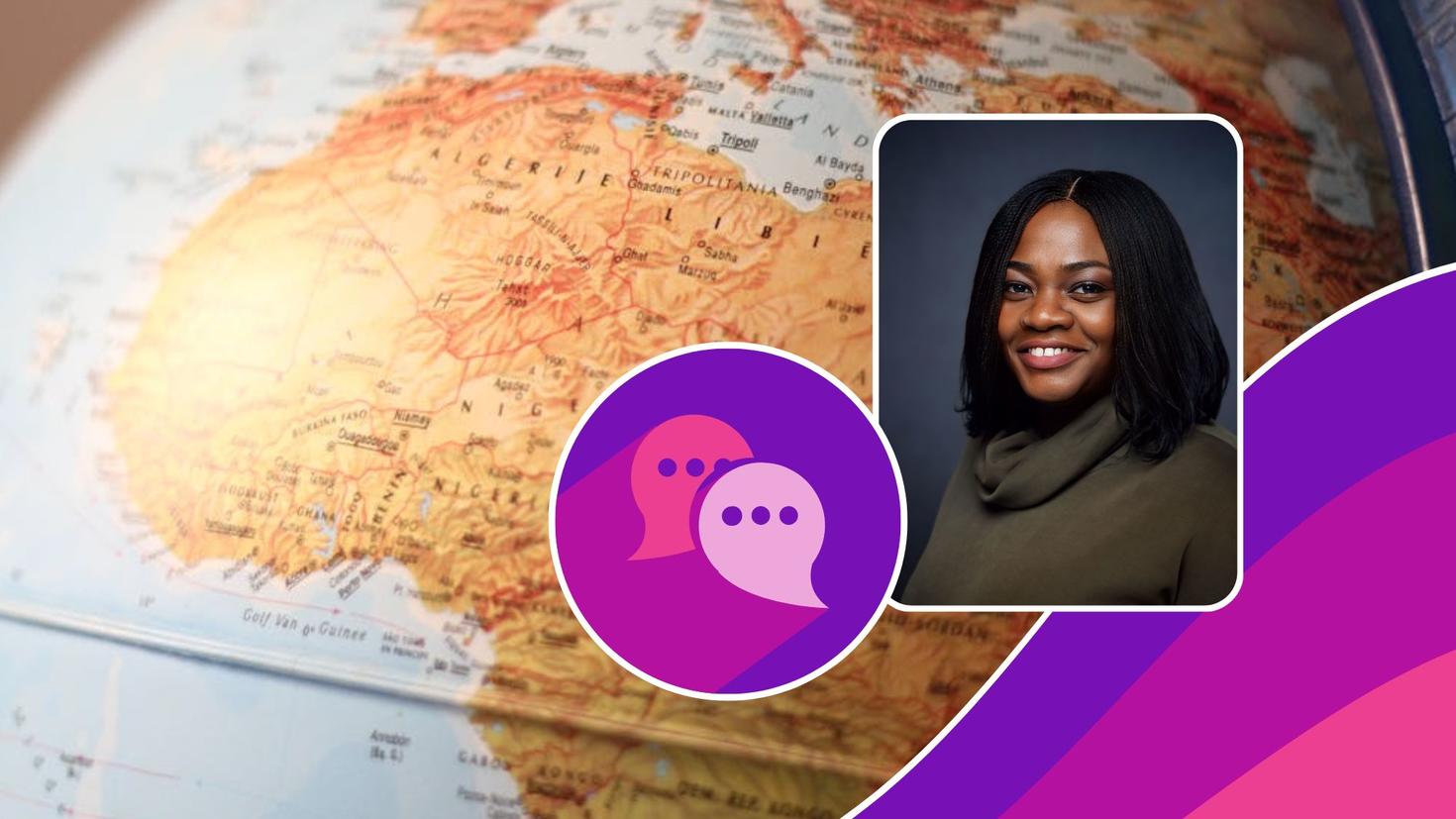From her roots in Benin City, Nigeria – “the heartbeat of the Nation” – to her doctoral research on migration and labour mobility, Christiana brings a layered, global perspective to questions of law, justice, and human dignity.
At the centre of her doctoral work are Bilateral Labour Agreements (BLAs), international arrangements that govern the movement of migrant workers. Christiana examines these agreements not only as technical contracts between states, but as instruments that deeply shape people’s lives. By approaching BLAs through postcolonial and feminist lenses, her research exposes how migration law both reflects and reproduces power, and how alternative frameworks rooted in African histories and lived realities could create more equitable outcomes for workers, especially women.
In the following conversation, Christiana reflects on her research journey, the communities that sustain it, and the vision that drives her to ask hard questions about the “neutral” language of international law.

“At its heart, my research is about showing that beyond being just contract arrangements, BLAs are instruments that shape people’s lives, and should echo this reality.”
Christiana Sagay
Tell us about yourself and how you came to be a student at the University of Ottawa.
Christiana Sagay: It is never easy to capture who I am in a few words. I wear many hats, and to different people, I represent different things. But if there are two qualities that have consistently shaped my journey, they are curiosity and creativity. Curiosity has always driven me to ask difficult and sometimes uncomfortable questions, while creativity has guided me to imagine new ways of approaching them. Together, they have defined how I see the world, and how I have chosen to move through it.
I grew up in Benin City, Edo State, Nigeria, “the heartbeat of the Nation”. Its energy comes from history as much as from geography, the cultural richness of the Benin Kingdom, its central location as a meeting point, and its reputation as a place that never stops moving. Being raised there taught me to see the world as layered, complex, and full of stories waiting to be told. Though my father is Ghanaian, I have always identified as a Bini girl. But in truth my father’s Ghanaian roots added another dimension, shaping me into someone who sees identity as both local and global.
When I first came to Ottawa, I felt an unexpected familiarity. The city, with its mix of languages, cultures, and traditions, seemed to mirror the world I grew up in and some of the other places I have lived. It felt like another meeting point, a place where histories and identities intersect, much like “the ancient city of Benin,F” as it is called, but with a new rhythm. That sense of recognition drew me to the University of Ottawa, where I found the space to pursue some of the questions that had long animated me.
In some ways, I’d say that pursuing my PhD here has been a continuation of a lifelong journey. And so, it seems a natural unfolding of who I am and the values I carry with me.
What is the focus of your research, and what inspired you to explore this topic?
C.S.: My research focuses on the transnational labour mobility of migrants in and from Africa, with a particular interest in Bilateral Labour Agreements (BLAs). My focus lies in the tension between migration diplomacy, understood as interstate bargaining and foreign policy strategy, and the actual protection of migrant workers’ rights on the ground. This focus, I’d say, grew mostly out of countless conversations about borders with several of my friends and academic peers.
As I once wrote in my 2021 personal statement for my PhD application:
“Having lived in two countries and four cities in the last five years, continually learning and unlearning; visiting Argentina, Barbados, Chile, China, Croatia, France, Ghana, India, Malawi, Mexico, Senegal, Serbia, Sri Lanka, South Sudan, The Gambia, Paraguay, and Venezuela, all without a visa or a plane ticket – only through social interaction with my intellectual peers who were nationals of these countries. These interactions with migrants, such as myself, have enriched and continue to enrich me daily and have caused me to interrogate in greater depth salient issues that touch on the transnational labour mobility of migrants – especially migrants from third-world countries. It has caused me to think critically about how the implementation of international laws and policies may differ depending on a migrant’s country of origin. These interactions have caused me to x-ray the ‘seemingly neutral’ text of the Global Compact for Safe, Orderly and Regular Migration (GCM), aimed partly at framing a global migration governance framework. These experiences and questions have irked me and form the basis upon which I choose to engage in my research.”
Those encounters taught me that beyond movement across borders, migration is also about the exchange of stories, worldviews, and power. They caused me to quiz the neutrality of international law, its impacts, shifts and consolidation. This realization continues to inspire my research today, driving me to explore how African perspectives, histories, and gendered realities can shape more equitable frameworks for labour mobility. This matters because such analysis disrupts the dominant “win–win” narrative and challenges scholars and policymakers to confront how international law manages inequality.

“I hope my research encourages others, whether scholars, officials, or advocates, to ask harder questions about the “neutral” language of international law.”
Christiana Sagay
What do you hope other researchers, policymakers, or practitioners will take away from your work?
C.S.: At its heart, my research is about showing that beyond being just contract arrangements, BLAs are instruments that shape people’s lives, and should echo this reality. I hope other researchers will see how looking at these agreements through both postcolonial and feminist lenses can open new ways of understanding migration law, moving beyond formal texts to the power, exclusions, and possibilities that they carry.
For policymakers and practitioners, my work offers a reminder that BLAs can be designed differently. By listening to migrant workers, especially women, and grounding these agreements in African histories and legal traditions, we can move toward frameworks that are more equitable, practical, and effective.
Ultimately, I hope my research encourages others, whether scholars, officials, or advocates, to ask harder questions about the “neutral” language of international law, and to imagine what migration governance beyond narrow economic interests might look like if it truly centred dignity, fairness, and lived realities. In doing so, I hope my work adds to the conversations advanced by other critical scholars on whose shoulders I stand, and if it sparks new dialogues in that tradition, I will consider it a success.
How has your experience at the University of Ottawa shaped your research journey so far?
C.S.: As I mentioned earlier, when I first came to Ottawa, I felt an unexpected familiarity about the city, and I hoped to have that sustained feeling within the University walls. I’d say those expectations have been met. The University of Ottawa has provided the intellectual home I was searching for, where I can explore questions about migration, law, and justice in ways that feel deeply connected to both my personal story and my academic vision.
Beyond the research itself, what has truly shaped my journey here are the relationships and communities I have built. Along the way, I have made lifelong friends who have stood by me in unimaginable ways, reminding me that while ideas are powerful, scholarship is ultimately sustained by people who walk alongside us.
In many ways, my time at the University of Ottawa has given me grounding. It often feels like a natural unfolding of who I am and the values I carry, curiosity, creativity, and community.

“I have made lifelong friends who have stood by me in unimaginable ways, reminding me that while ideas are powerful, scholarship is ultimately sustained by people who walk alongside us.”
Christiana Sagay
Have you had opportunities to get involved with research centres or research networks during your studies? If so, how have these experiences enriched your academic journey?
C.S.: Yes, I have been fortunate to engage with several research centres and networks that have shaped both my scholarship and my sense of community. Just before beginning my program in Fall 2021, my supervisor, Professor Delphine Nakache, invited me to join the Canadian arm of the VULNER project. I started here as a researcher and quickly stepped into the role of research coordinator, which thrust me into the heart of international collaboration. Suddenly, I was managing research activities, liaising with partners in six other countries, and learning, in real time, the full spectrum of research project management. What made it truly meaningful, though, was knowing that the work directly impacted how people seeking protection in Canada navigate the legal system. It was the kind of project that reminded me why I chose this field and school in the first place.
Earlier this year, Professor Nakache was named the University Research Chair on Migrant Protection and International Law. I collaborate with the Chair on three integrated research streams. These streams bridge disciplines and explore how Canada’s domestic and international policies affect diverse migrant populations, including temporary workers, international students, non-status migrants, asylum seekers, and refugees. Being part of these initiative have deepened my expertise and connected me with a vibrant network of scholars and practitioners who are reimagining migration governance, and I am excited about all the upcoming initiatives.
Also, I am a student member at the Human Rights Research and Education Centre (HRREC), thanks to Professor Julie Ada, who sponsored my membership, and Professor Olabisi Akinkugbe, who spoke so highly of his own involvement as a PhD student and encouraged many of us during his visit to engage with the Centre. I now serve as the student representative on the management committee. What I value most about HRREC is the camaraderie it fosters, lively discussions, shared commitments, and the chance to engage deeply with questions of international law alongside peers and faculty. I have especially appreciated the sharp, witty exchanges with Professor John Packer, the immediate past director, who has pushed me to think more critically and expansively about the field of international law.
Finally, I have participated in writing groups, colloquial research circles, and peer networks. These spaces may seem small, but they have been transformative, shaping some of my ideas, and offering encouragement such that scholarship becomes less of a solitary pursuit and more of a collective journey.
Have you been involved in teaching, publishing, or conference participation during your studies? What have those experiences meant to you?
C.S.: Yes. Each of these experiences, teaching, publishing, and presenting, has been deeply meaningful to me because they reflect stages of growth in my academic journey.
On teaching, I have had the opportunity to guest lecture on international human rights at Arizona State University, in the US, and this semester I am completing the practicum in university teaching, the final step toward earning the certificate in university teaching, where I will be teaching three classes. These experiences mean more to me than standing at the front of a classroom. I still remember, as a law student, how vulnerable I felt about my own knowledge, often hesitant to express ideas or engage in complex discussions. It was the collaborative exchanges with teachers and peers that helped me find my voice. That memory drives me to create classrooms where students feel safe to embrace vulnerability and curiosity, knowing these are the starting points for deep learning.
Publishing has been another way of finding and refining that voice. I have co-authored book chapters and recently contributed (along with my supervisor) a chapter to the Elgar Concise Encyclopaedia of Migration and Asylum Law. I have also written pieces for TWAILR and have an article forthcoming in AJIL Unbound. Each piece represents both a learning process and an opportunity to contribute to critical conversations that extend beyond the classroom.
Conference participation has been equally rewarding. I have presented at conferences across Europe, Africa, Canada, and the United States, including at the Annual Conference and Mid-Year Meetings of the American Society of International Law. These gatherings have given me the chance to test ideas, receive generous critique, and engage with a global community of scholars and practitioners who, like me, are working to rethink the structures of international law.
Taken together, teaching, publishing, and conference participation have in addition to building my academic profile, continue to help and shape me into a more confident, reflective, and community-oriented scholar.

“In the end, the most rewarding part of the journey will be beyond what you produce, but who you become along the way and the kinship you develop.”
Christiana Sagay
What advice would you give to someone considering graduate studies in law?
C.S.: When I first thought about graduate studies in law, I assumed it would be mostly about mastering texts and producing research. What I have learned is that it is just as much about becoming, about finding your voice, your values, and your vision as a scholar and as a person.
There are a few pieces of advice I can offer. One I’d start with is, if you have not, please read How to Succeed (and Stay Human) in Law School by Lynda Collins. School, whether law school or graduate studies, can feel like a beehive of competition: grades, grants, and recognition. And all of that has its place. But alongside striving, it is just as important to stay human, to remember that you are more than your outputs.
I often say that doing a PhD is part of my life, not my whole life. That mindset keeps me grounded and allows me to integrate what I am learning in ways that feel impactful and meaningful. It pushes me to keep asking: How do the questions I raise connect to lived realities? How do they matter to the communities I care about?
So, the advice I’d leave here is simple: approach graduate studies with curiosity and courage, embrace the vulnerability of not knowing, and seek out community. Strive for excellence, yes, but also stay human. In the end, the most rewarding part of the journey will be beyond what you produce, but who you become along the way and the kinship you develop. Those bonds will make the dreary days easier, and yes, those days will come.
